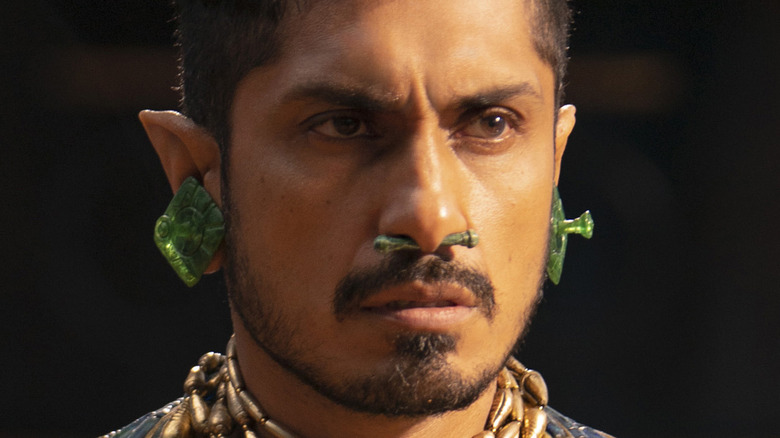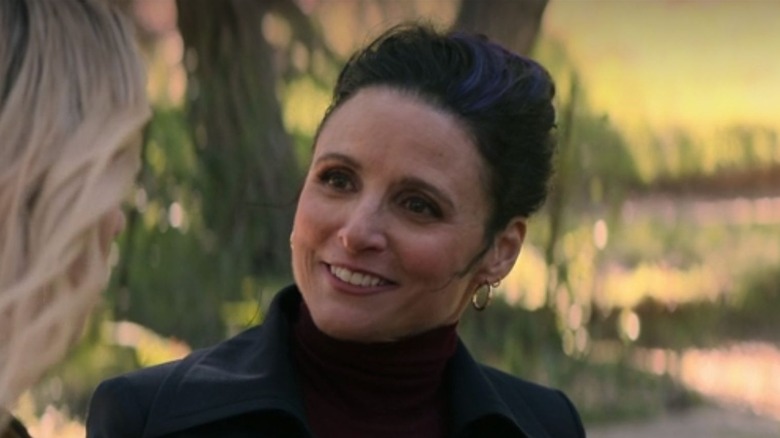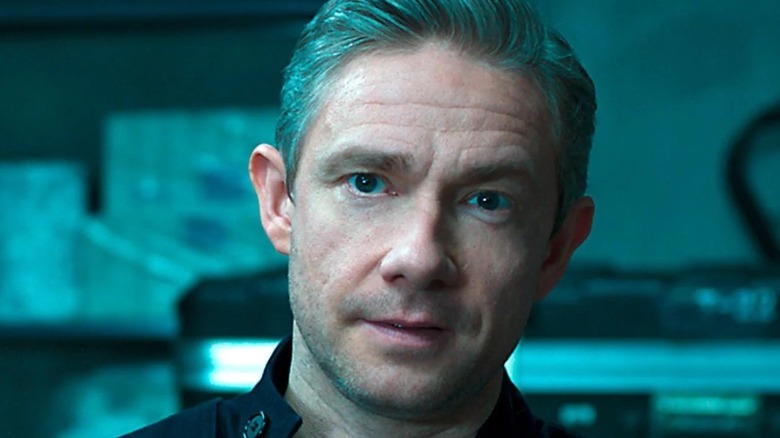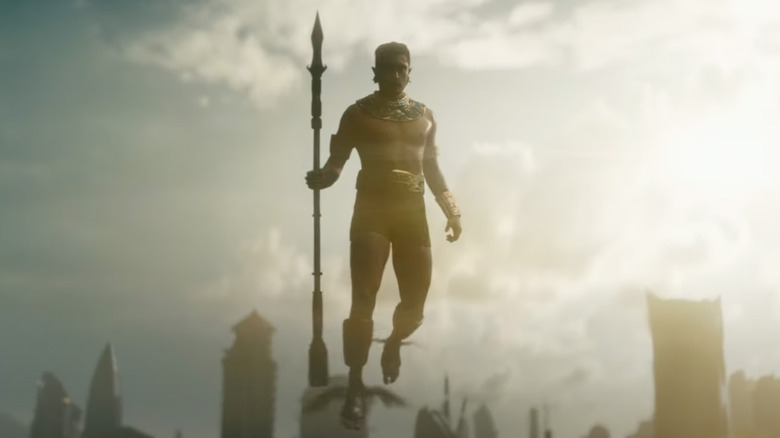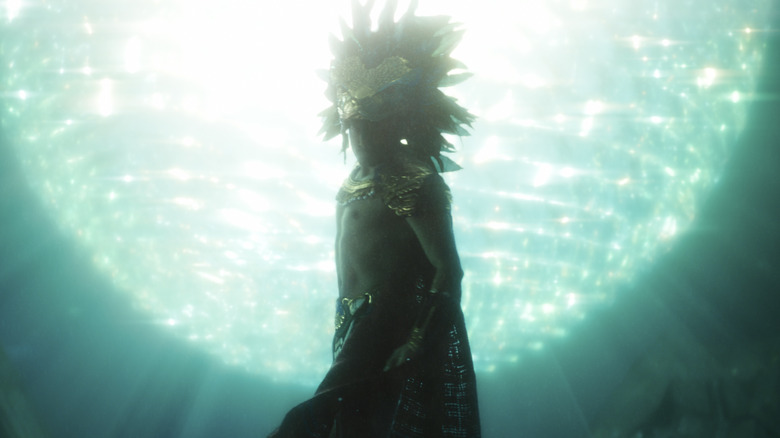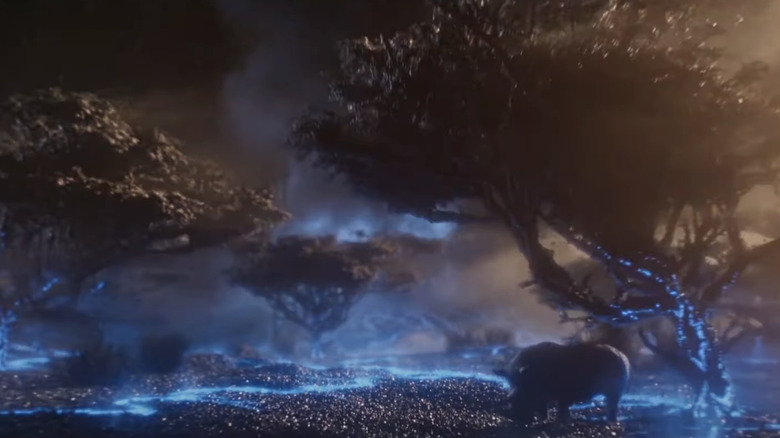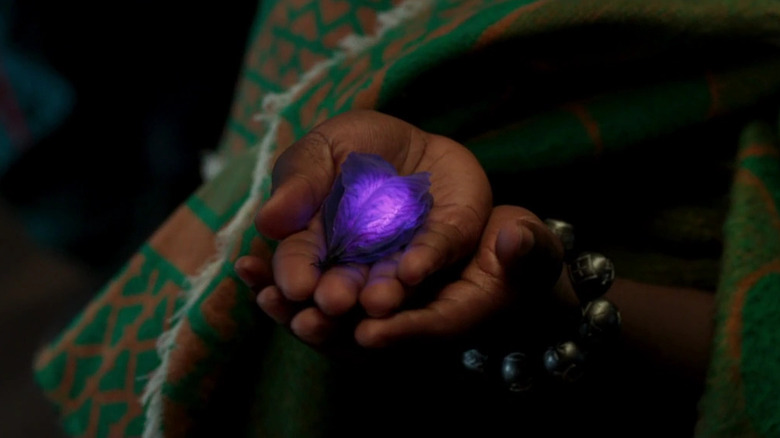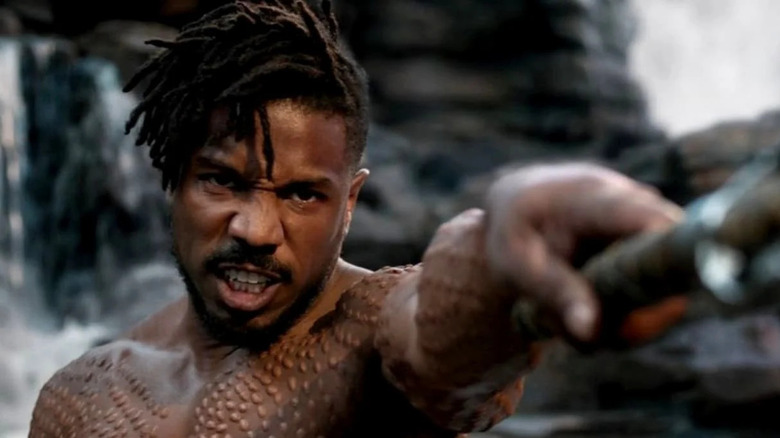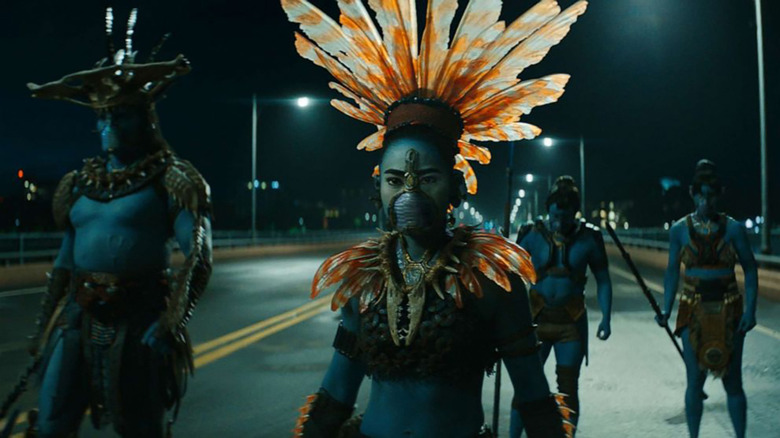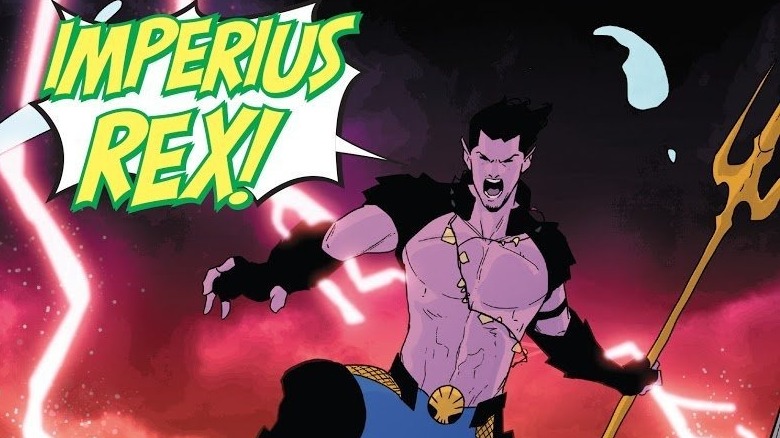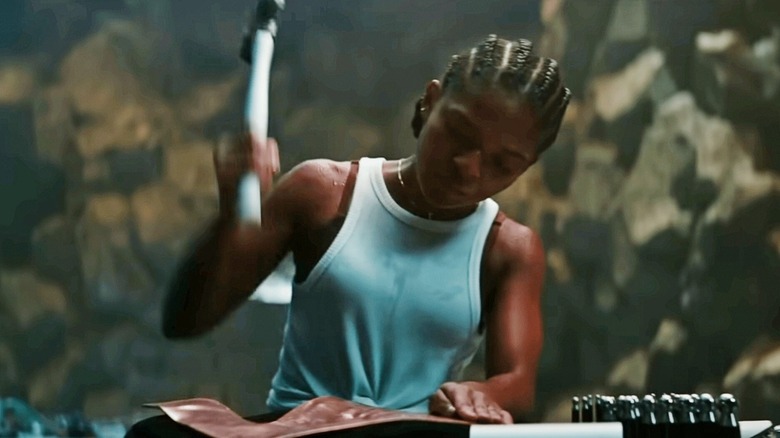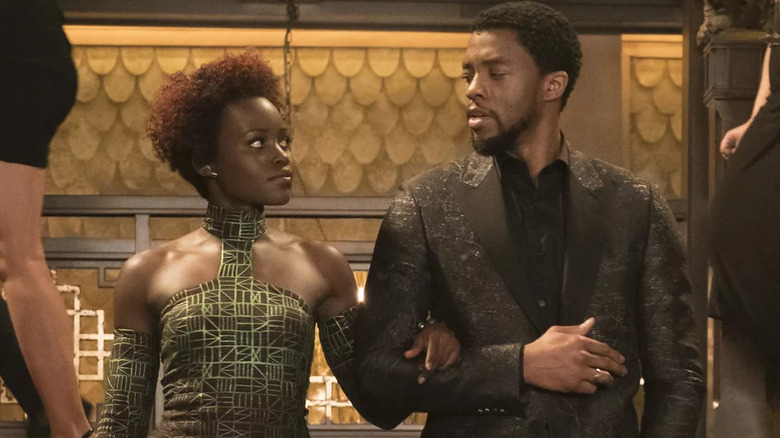Lines In Black Panther: Wakanda Forever That Are More Important Than You Think
The first "Black Panther" was released in 2018 and elevated the previous 10 years of the Marvel Cinematic Universe to a new level of representation and quality. After an overwhelming wave of critical praise and commercial success — a rare $1 billion-plus of success — the movie became an incontrovertibly important evolution for superhero movies and mainstream movies in general. When audiences finished soaking in the effortlessly cool performance of star Chadwick Boseman, the masterful direction by Ryan Coogler, and the stellar performances of the supporting cast and crew (it's almost impossible to not mention composer Ludwig Göransson at some point), it became clear that the film was a landmark in its genre and an important signpost for what tentpole movies could become.
After four years, a pandemic, and the tragic, untimely death of Boseman, the surprisingly reassuring news for fans is that "Black Panther: Wakanda Forever" is every bit as excellent and impactful as the first film. Like "Black Panther," the new film opens up the MCU in a number of major ways, and to those who pay close attention to its most subtle lines, it does so even more. Let's try and unpack as much of that significance as we can, as we analyze the lines in "Black Panther: Wakanda Forever" that are more important than you think.
Warning: Contains spoilers for "Black Panther: Wakanda Forever."
Director de Fontaine
We've seen Julia Louis-Dreyfus's character Valentina Allegra de Fontaine lurking around the MCU since "The Falcon and The Winter Soldier," and yet never truly understood either her position or her motivations. We saw her recruit the U.S. Agent to an unnamed organization for unnamed reasons, we saw her sic Yelena Belova on Hawkeye by convincing her that he caused her sister's death for equally unnamed reasons, and that was it for a while.
At last, de Fontaine has reappeared, and thanks to the way in which Everett Ross (Martin Freeman) addresses her, we finally know her role in all of this: she's the director of the CIA, and therefore a top American agent. What's more, any recruiting she does is on behalf of the American government, making her inevitable assemblage of the Thunderbolts an American national acquisition.
When Ross clears his throat, stands up straight, and refers to her as "Director de Fontaine," it's clear how much power she wields, and as director of the CIA, it becomes even clearer: de Fontaine is on par with Nick Fury when it comes to global politics. Every action she's taken up to this point needs to be reviewed with a fresh eye, one aware of the true importance that de Fontaine carries.
Our marriage
Because "Black Panther: Wakanda Forever" is not content with any single reestablishment of the status quo, it adds to the news that de Fontaine is the CIA's new director with the revelation that Ross and de Fontaine used to be married. When the pair share an uncomfortable car ride and bring up their former, failed romantic relationship, the implications immediately make both Ross and de Fontaine potentially more important than ever.
Not only is de Fontaine the director of the CIA and the soon-to-be leader of the Thunderbolts, but she's also a woman with an ax to grind when it comes to one of Wakanda's greatest allies. Likewise, Ross is a top-tier intelligence agent (although a freelancer by the film's end), a personal colleague of multiple Avengers, and one of the few Americans that the Wakandan royal family trusts. That makes two important geopolitical figures and liaisons to the superhero community also two people with personal grudges. Even more crucially, it makes it extremely likely that the pair have privileged intel on each other.
The combination of their mutual influence, enmity, leverage over the other, and close connections to other superpowers (both politically and literally) gives the duo of Ross and de Fontaine the potential to become major supporting players in the MCU's future.
I was a mutant
Marvel fans have begged to see mutants in the MCU since its inception, and ever since Disney's 2019 acquisition of Fox, their introduction stopped being a matter of faith and became a simple matter of time. Gradually, fans' wishes started coming true, most notably in the form of a multiversal Charles Xavier in "Doctor Strange in the Multiverse of Madness" and the revelation that Kamala Khan's blood contained "something different ... like a mutation." But not until "Black Panther: Wakanda Forever" has a character explicitly and plainly been identified as a mutant.
When Namor (Tenoch Huerta Mejia) explains his and his people's histories to Shuri, he describes his unprecedented birth to her by saying in no uncertain terms, "I was a mutant." Not only is this true to his comic book origins, in which he is the mutant son of mixed Atlantean/human parents, but it also means that mutants exist in the MCU, and more specifically in the main timeline of Earth-616. For all the hints and teases before — even going back to Hydra scientists describing Wanda and Pietro as "miracles" in "Captain America and the Winter Soldier" — fans can now finally celebrate without fear of it being premature: the MCU has officially mutated.
They spoke Yucatan Mayan
From the first teaser trailer for "Black Panther: Wakanda Forever," it was obvious that Namor and his people had been inspired by Mesoamerican culture, a fact that the cast and crew (like Huerta) later confirmed. But when the film was finally released, a few key lines of dialogue revealed that Namor's people are not just Atlanteans with Mesoamerican influences — they are Mesoamericans themselves. Specifically, Namor and the rest of the Talokanil took to the sea directly from the Yucatán Peninsula in modern-day Mexico.
We learn from M'Baku (Winston Duke) that Namor's people refer to him as "K'uk'ulkan," the feathered serpent god, and that, too, is a real deity from Mayan mythology — perhaps better known by his Toltec and Aztec name, Quetzalcóatl. Likewise, the name of Namor's city, Talokan, and its people, the Talokanil, are references to actual Aztec mythology, specifically the city of Tlālōcān. In addition, the modern-day Talokanil are said to speak a variation of "Yucatan Mayan," conclusively proving that they are not simply meant to honor the Mexican people in spirit, but are actual Indigenous Mexicans. This represents a major leap forward in representation for the MCU and for superhero movies in general, which have historically lacked Latino representation.
There could have been other meteors
The plot of the first "Black Panther" was built around one central premise: the hidden and heretofore unknown nation of Wakanda is stronger than any other on Earth, primarily thanks to its exclusive access to vibranium. The unique properties of the metal offered ancestral Wakandans the ability to progress faster than any of their peers and develop into the modern technological utopia they are. Thanks to "Black Panther: Wakanda Forever," we now know that Talokan has had its own vibranium supply for hundreds of years, allowing them to rival Wakanda in technological sophistication. But the movie drops an even bigger bombshell at the same time — yes, ancient Wakanda was struck by a vibranium-laden meteorite, and yes, Talokan was, too. Still, in Shuri's words, "There could have been other meteors."
Vibranium has always been a resource capable of shifting power in the MCU. It turned an oversized frisbee into the legendary weapon of Captain America and it endowed Ultron with a body capable of withstanding blows from Thor and the Hulk. Now that the MCU has made it likely that the "rarest metal on Earth" might not actually be so rare, the metal might play a bigger role in its future. Vibranium is already all over the comics, often coming in the form of major upgrades to characters' arsenals, so we might be seeing similar upgrades in the MCU's future. For one thing, Riri Williams (Dominique Thorne) is now in need of a new suit...
A blue plant growing on a glowing rock
The MCU has seemingly taken every opportunity it's had to expand its cast and setting, and "Black Panther: Wakanda Forever" is no exception. In addition to notable heroes like Namor and Ironheart, locations like Talokan, and an unknown amount of new vibranium, the movie adds yet another new source of superpowers: a new strain of the heart-shaped herb.
The first herb we encountered grew in Wakanda and was ingested by the Black Panthers in order to gain their superhuman powers. This new plant, not yet given a name, is an obvious cousin to the first herb — another "blue plant growing on a glowing rock" — but grows on the ocean floor and grants the Talokanil their own set of powers. The first herb created the Black Panthers, the second herb created the super-strong, water-breathing Talokanil, and one question practically begs itself: what else has the presence of vibranium mutated, plant or otherwise?
With the only two known vibranium meteorites producing at least two power-granting plants, the presence of a third meteorite and beyond could mean any number of additional powerful herbs, or even other lifeforms. Might the MCU's Earth be home to vibranium-mutated fungi and animals, as well? With comic book inspirations that include literal dinosaurs, future MCU projects have the freedom to incorporate essentially any fantastic creatures they choose.
N'Jadaka. You chose me.
By now, it's no secret that Shuri is T'Challa's successor as the new Black Panther, as well as the new ruler of Wakanda. Like T'Challa and a long, long line of Panthers before him, Shuri gains her powers by ingesting the heart-shaped herb and subsequently embarking on a journey of spiritual discovery on the Ancestral Plane. Also like the Panthers before her, she is met on the Ancestral Plane by a former Panther, but that's when the similarities stop. While T'Challa met with his virtuous father, T'Chaka, and he with his father, and so on, the spirit guide that Shuri's soul prepares for her is Erik Killmonger, the murderous terrorist who seized the Panther title and attempted to use it to hold the world hostage.
Whether you're one of the fans who believe that Killmonger was right or not, it's inarguable that Killmonger's presence on the Ancestral Plane is a major break from the norm, and potentially an important one. The MCU lore is clear: the deity Bast is in charge of bringing souls to the Ancestral Plane (and as of "Thor: Love and Thunder," is confirmed to be real), meaning that Bast finds Killmonger worthy of the eternal paradise. Either that or the mighty goddess is subject to supernatural technicalities, which certainly makes Earth's sorcerers stronger than we previously thought.
A form of sonic hypnosis
In the Marvel comics, the people of Atlantis are amphibious and blessed with a basic suite of superhuman functions, like advanced strength, speed, and senses. When it came time to adapt the Atlanteans into the Talokanil for "Black Panther: Wakanda Forever," the already-formidable people gained another new power, and it carries with it some heavy mythological allusions. Wakandan scientists describe it as "a form of sonic hypnosis," but the magical ability it alludes to is obviously the Siren's Song, giving the otherwise-Mesoamerican Talokanil a decidedly Greek flair.
With the recent introduction of Zeus and Hercules in "Thor: Love and Thunder," the MCU has confirmed that at least some portion of Greek mythology is real. Now, with the knowledge that the Atlantic Ocean has harbored actual mer-people with actual Siren Songs for hundreds of years, the relationship between the Talokanil and world mythology may be stronger than it seems. While it's true that a couple of thousand years separate the Talokanil from the original Sirens of Homer's "Odyssey," they might have served to keep the myth alive for centuries. After all, the myth of the god K'uk'ulkan predates Namor and his people becoming the Talokanil by potentially just as many thousands of years, but Namor still boasts that title, and the modern-day people of the Yucatán Peninsula still worship him accordingly.
Imperious Rex!
Many lines that pop up in Marvel movies are more important than they seem because of the larger implications they carry with them. In a setting as rich in fantasy, science fiction, and other mythology as the MCU, even the most innocuous of dialogue can mean more than it might seem, or even more than its writers intended. On the other hand, some lines are more important than you think just because of how awesome they are. That's the case for "Imperius Rex," the line that Namor shouts during his final battle with Shuri, just minutes before the movie's end.
For any viewers of "Black Panther: Wakanda Forever" not familiar with Namor's comic book counterpart, his shout of "Imperius Rex!" just minutes before the movie's end probably seems more random than awesome, but it is anything but. In the comics, Namor has shouted "Imperious Rex!" as a battle cry for decades, and it has become one of Marvel's most enduring catchphrases. The line is in Latin, and when translated, loosely means "Imperial King" or "Emperor King." For fans familiar with Namor's characterization in both the comics and movies, there are perhaps no two words that fit him more. Above all else, Namor is defined by his arrogance, and what's more arrogant than shouting two words in Latin that mean supreme ruler?
I can't let you keep it
By the end of "Black Panther: Wakanda Forever," the young tech prodigy Riri Williams has finally constructed the Ironheart suit, a personal, mechanized suit of armor every bit as miraculous and sophisticated as Tony Stark's. She's become the new Stark in multiple ways — including as a female counterpart to Stark for the Young Avengers generation — and is therefore primed to be an important player in the MCU going forward. The problem with her new status is that as soon she gets the suit, she loses it. Before Shuri flies Riri home, she tells the young inventor, "The suit's a great design, but ... I can't let you keep it."
Shuri has a few good reasons for not letting Riri take the suit. Riri's young and relatively inexperienced, the suit contains proprietary Wakandan technology, and Wakanda's position within the global community is more tenuous than ever. But regardless of Shuri's ample justification, her decision to keep the suit in Wakanda is important for the upcoming Ironheart TV series on Disney+. One of two major events is now virtually guaranteed to occur: either part of the new series will take place in Wakanda, or Riri will be forced to create another new version of the armor — the Ironheart Mark III.
This is your auntie, Shuri
Over the MCU's history, some of its films have managed to generate genuinely awe-inducing moments that make theater audiences gasp. While it may be a while before any moment captures the (literal) electricity that took over audiences when Captain America first lifted Mjolnir, "Black Panther: Wakanda Forever" has generated its own significant entry into the MCU's top gasp-inducing moments.
During the movie's sole end-credits scene, Shuri takes Nakia (Lupita Nyong'o) up on her offer to come and visit her in Haiti. When she does, Nakia introduces her to a very special young man, telling him, "This is your auntie, Shuri." The boy then introduces himself as Prince T'Challa, son of King T'Challa, making him the heir to Wakanda's throne and the title of Black Panther. In other words: before T'Challa's death and Nakia's self-imposed exile from Wakanda, the pair had a child.
The child is more important than you might think, as he isn't just some feel-good addition meant to end the film on a hopeful note. He's also the literal and spiritual perpetuation of T'Challa in the MCU, and even beyond that, a perpetuation of Chadwick Boseman in the MCU. If there are any Black Panther fans for whom that isn't enough, then it's worth pointing out that the young T'Challa's father was super-powered at the time of conception — the same as Namor's mother — meaning that, in a sense, he may already be another Black Panther.
